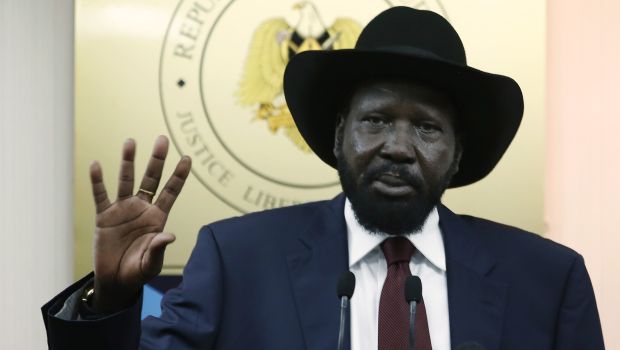
South Sudan’s President Salva Kiir gestures during a news conference in Juba on December 18, 2013. (REUTERS/Goran Tomasevic)
London/Khartoum, Asharq Al-Awsat—South Sudan President Salva Kiir said on Wednesday he was prepared to talk with former Vice-President Riek Machar, despite having accused him of attempting to organize a coup over the weekend, as his government sought to play down fears of the outbreak of widespread ethnic violence in the country.
Speaking at a news conference, Kiir said: “I will sit with him at a negotiation table, but I do not know what the outcome will be.” He did not clarify what the talks would involve or who was sponsoring them.
The government of Uganda said on Wednesday that it had been asked by the UN to negotiate an end to the violence that has wracked South Sudan over the last week, but it is unclear if this is what Kiir was referring to.
Meanwhile, South Sudan Foreign Minister Barnaba Benjamin told Asharq Al-Awsat that his government always favored dialogue and that “Machar and his group carried out the failed coup attempt, which was dealt with by the government.”
Benjamin added: “We did not discuss the details of the dialogue or if regional or international parties would be involved,” but that a number of regional states had showed concern and called for calm.
Meanwhile, former education minister and ruling party official Peter Adok said that he held Kiir responsible for the fighting between army units in the last few days, which is reported to have killed at least 500 people so far.
Adok told Asharq Al-Awsat that “Kiir is not serious about holding any form of dialogue,” asking, “Kiir refused to talk through the political bureau and the liberation council within the party, so, how can he accept it now after this fighting on ethnic grounds?”
He said: “There was no coup attempt by Machar or the leaders who were arrested, but Kiir used the clashes between the military units as an excuse to get rid of them.”
Machar told the Sudan Tribune newspaper on Wednesday that the allegations that he had tried to organize a coup attempt were false, and were “an attempt by President Salva Kiir to get rid of his political critics in the party and government.”
In the meantime, South Sudan’s foreign minister denied claims that the fighting was caused by ethnic tensions. Benjamin said that the army’s chief of general staff, Gen. James Hoth, was from the same Nuer people as Machar, which proves this was not an ethnic clash between the Nuer and President Kiir’s Dinka people.
A statement on the government website said: “There are people out there saying what has happened is between the Dinka and the Nuer tribesmen. We the leaders of this country want to state here that this is not true.”
The government spokesman said on Tuesday that 10 people who were involved in the coup attempt had been arrested, while Machar and a number of others were still at large.
On Tuesday, international media outlets reported that the fighting between rival army units had spread from Juba to the capital of Jonglei state, Bor, 125 miles away.
A South Sudan army spokesman confirmed on Wednesday that the town had been captured by rebels after gun battles over night.
The spokesman, Colonel Philip Aguer, said: “Our soldiers have lost control of Bor to the force of Riek Machar.”
“There was shooting last night . . . We don’t have information on casualties or the displaced in the town, as operations are ongoing,” he added.
However, he insisted that the government was still firmly in control of Juba, saying “the streets are busy and shops are open.”
Additional reporting contributed by Ahmed Younis.
